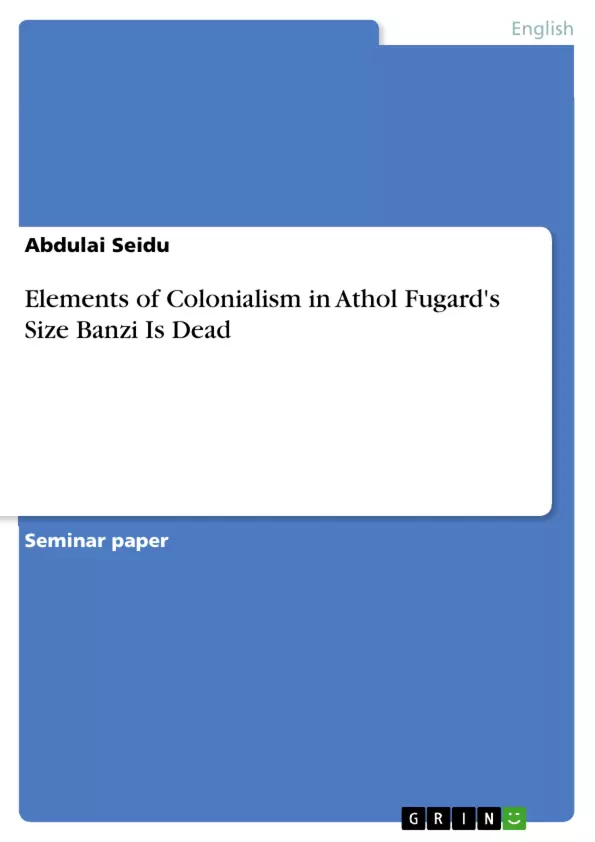This paper takes a cursory look at the elements of colonialism in Sizwe Banzi is Dead, written by Athol Fugard.
The work focusses on the different facets of colonial and post-colonial images of racial discrimination, exploitation, oppression, torture, dehumanization, and alienation, as well as the manner in which the dramatist explicates these horrible consequences in his work, Sizwe Bonzi Is Dead. It provides a critical viewpoint on the playwright's portraiture of many characters, themes, and other concerns highlighted as symbolic representations of diverse aspects of colonialism.
According to the research, Athol Fugard's Sizwe Bansi Is Dead is a literary endeavour to wage a literary war against European and Western imperialists who continue to make life difficult for minorities, colonized, and oppressed people, particularly in South Africa.
Inhaltsverzeichnis (Table of Contents)
- Abstract
- Introduction
- Review of Relevant Literature
- The Concept of Colonialism
- Colonialism in South Africa
- Apartheid in South Africa
- Elements of Colonialism in Athol Fugard's Sizwe Banzi Is Dead
- The Character of Sizwe Bansi
- The Theme of Identity and Self-Definition
- The Theme of Resistance
- The Theme of Violence
- Conclusion
Zielsetzung und Themenschwerpunkte (Objectives and Key Themes)
This paper aims to analyze the elements of colonialism present in Athol Fugard's play, "Sizwe Banzi Is Dead." It examines the different facets of colonial and post-colonial imagery of racial discrimination, exploitation, oppression, torture, dehumanization, and alienation, as well as the manner in which the dramatist portrays these consequences in his work.
- The impact of colonialism on individual identity and self-definition
- The nature of resistance to colonial oppression
- The role of violence in maintaining colonial power
- The enduring legacy of colonialism in post-colonial societies
- The use of theatre as a tool for social commentary and resistance
Zusammenfassung der Kapitel (Chapter Summaries)
- Abstract: Provides a brief overview of the paper's focus on examining the elements of colonialism in "Sizwe Banzi Is Dead," highlighting themes of racial discrimination, exploitation, and oppression.
- Introduction: Introduces the play "Sizwe Banzi Is Dead" and its author, Athol Fugard, exploring the historical context of apartheid in South Africa and the play's universal relevance.
- Review of Relevant Literature: Explores the concept of colonialism, its historical development in South Africa, and the specific context of apartheid legislation.
Schlüsselwörter (Keywords)
This paper examines the key concepts of colonialism, apartheid, identity, resistance, violence, and theatre as a form of social commentary. It explores the impact of colonial and post-colonial experiences on individuals and society, highlighting the themes of oppression, exploitation, and the struggle for self-definition.
- Quote paper
- Abdulai Seidu (Author), 2024, Elements of Colonialism in Athol Fugard's Size Banzi Is Dead, Munich, GRIN Verlag, https://www.grin.com/document/1500209



